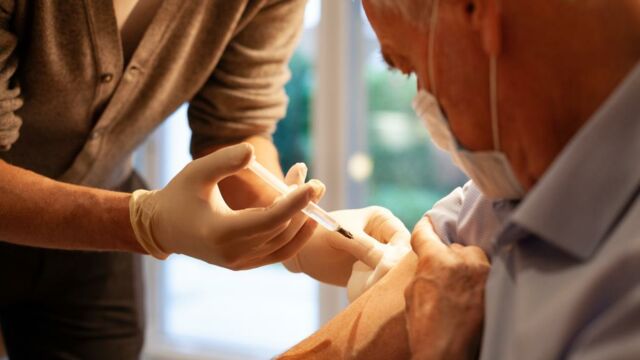A recent study by Liverpool University and published in the UK Scientific Advisory Group for Emergencies found that over 500 people in Britain were admitted to hospital with coronavirus within three weeks after receiving their first COVID vaccines.
Discover our latest podcast
Those admitted to the hospital represent just 1% of the 52,000 people who participated in the study. The report also revealed that most of those hospitalised were elderly and were most likely exposed to the virus just before or after getting their vaccines. The report warned:
Elderly and vulnerable people who had been shielding, may have inadvertently been exposed and infected either through the end-to-end process of vaccination, or shortly after vaccination through behavioural changes where they wrongly assume they are immune.
Study highlights ‘vaccine failures’
The study found that a total of 526 people had been admitted to hospital after receiving their first dose, and of those people, 113 people had died. The research team has labelled the incidents as ‘vaccine failures.’
However, researchers also disclaimed that these ‘failures’ were to be expected. Professor Colin Semple of outbreak medicine at Liverpool University and one of the study’s authors explained to the Times:
People should not be surprised about some vaccine failure. It is what was predicted. It does result in tragedy. We are all talking about the statistics, but if it is your granny it is a tragedy for your family.
The authors highlighted that the research took place between December 8th to March 10th, when the vaccine rollout was geared towards the elderly and most vulnerable priority groups.
Despite the findings of the study, Brits should still opt for the vaccine. Coronavirus vaccines take at least two weeks to take effect. It was during this time that those 526 hospitalised people would have been infected. This also further proves that vaccinated people should still be cautious after getting their first and second doses of the jab to ensure proper protection before the vaccine takes effect.
Government removes care home restrictions
The study comes as the Government prepares to remove the care home restrictions that banned residents from leaving the premises. The Department of Health and Social Care (DHSC) has decided to lift the rules after being threatened with legal action by the charity John’s Campaign. Charity workers labelled the regulations as ‘barbaric’ and claimed care homes were ‘falsely imprisoning’ residents.
From Tuesday, care home residents will finally be able to leave their homes for ‘low risk’ visits without the need for a 14 day isolation period upon return. However, residents will need to be accompanied by a member of staff or one of the resident’s two approved visitors.
Residents will now be able to vote in person during the upcoming local elections and will be able to dine outside at restaurants and cafes if agreed upon with the care home in advance. The residents will still not be able to meet in groups or go indoors - aside from the use of the bathroom.
Recent data has revealed that 95% of care home residents have had their first dose of the coronavirus vaccine, while 71% have already received their second. Prime Minister Boris Johnson announced:
We know how challenging this time has been for care home residents, so I am pleased that they can now leave their homes to reunite with their loved ones outdoors.
He continued:
With the data continuing to head in the right direction and as restrictions ease, it is my priority to keep increasing visits for residents in the coming weeks in a safe and controlled way.















